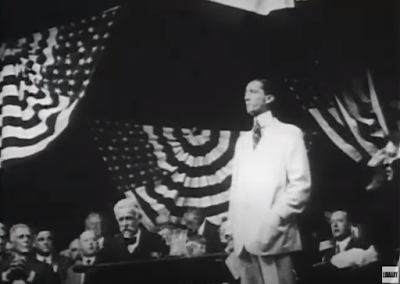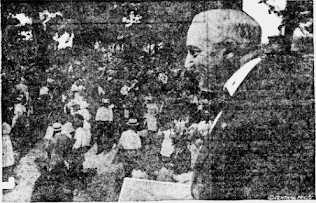Notification ceremonies are scheduled for 2 p.m. today at the pavilion in Garfield Park in Marion. According to the Associated Press, "Marion was dressed within an inch of its life for its debut in the great affairs of the nation and was bubbling over with eagerness to make the big day a smashing success. Patriotic frills and flounces draped the city from tip to toe. Business was adjourned and partisanship was forgotten as Republicans and Democrats joined in acknowledging the honor that had come to one of their neighbors."
MORNING
Thousands arrive in the city by special and regular trains, interurbans, and automobiles. Early arrivers include delegations from Chicago and New York.
At 7 a.m., Harding participates in a flag-raising ceremony in his front yard. Notice the crushed stone in place of a lawn.
Here's another photograph from a contemporary newspaper:
The first delegation arrives in front of his house, headed by the Marion Harding Marching Club. "I am going to make my speech later in the day," Harding tells them, "but I cannot let you go without saying how deeply I am touched by this tribute from the home folks."
The Caledonia cornet band in which Harding was a former member reunited after the Chicago convention and were in the crowd to play for the candidate.
Although no details of the date are in the record at the Ohio History Connection, this photograph, based on contemporary newspaper articles, shows a Pennsylvania Republican club in the parade:
The National Woman's Party, including Alice Paul, meets, as scheduled, with Harding at 10 a.m.
The Columbus Republican Glee Club, which will be part of the notification ceremonies in the afternoon, serenades the senator at his home with "He's a Great Big Man from a Great Big State."
Harding responds, "You have always been so very considerate in your friendship for me and I want you to know the son of a great American for whom you have sung often in the past. Let me present. Colonel Ted Roosevelt." Roosevelt, shown below on the Harding porch, tells the glee club that his wife's grandfather was from Columbus. "All I am going to say I speaking to you on this occasion is this, 'We are going to roll it up even bigger than before.' I thank you."
Harding also poses with Frank Hitchcock, a former chair of the Republican National Committee:
A delegate from Fostoria catches Harding's attention with a sign that reads "My wife is for Harding. First time we ever agreed." The sign is mentioned in numerous news reports:
Estimates of visitors in town run from 40,000 to 85,000, with one of the larger delegations traveling from Dayton, the hometown of Governor Cox. The New York Tribune reports, "In this host of people were thousands who boast that they 'knew McKinley,' scores who 'knew Grant,' and a feeble, white bearded few who 'knew Lincoln.' Each had journeyed here to-day with the earnest desire of adding to their vocabulary the phrase 'I know Harding.'"
Marion provides plenty of food and drink: "Pale lemonade was on sale at all street corner stands during the notification at five cents per glass, and while there was evidence that in some cases the product had been manufactured by dragging one lemon through a tubful of water, nevertheless the price was right and was cheerfully paid."
AFTERNOON
Harding joins members of the Republican National Committee and the notification committee for lunch at the Sawyer farm on the outskirts of town. They travel next to Garfield Park to watch the ceremonies.
Caption: It is expected that the formal notification to United States Senator Warren G. Harding that he has been nominated for the presidency by the Republicans will be made in White Maple pavilion, Garfield park, Marion, Ohio.
Only ticket-holders are seated in the circular Chautauqua pavilion; thousands of others congregate in the park, which was not ideal, according to the Dayton News: "Those not blessed with extreme pedal propensities or alertly-keen auricular appendages could derive little satisfaction from the historic speeches." Despite an invitation, none of the candidates who competed for the nomination is in attendance.
Will Hays (above) presides over the event, which finally starts at 2:27 p.m.:
- "The Star Spangled Banner" – Columbus Republican Glee Club
- Invocation – Bishop William F. Oldham
- Notification – Senator Henry Cabot Lodge
- Acceptance – Senator Warren G. Harding
- "America" – Columbus Republican Glee Club
- Benediction – Rev. Joseph Denning
Harding begins his speech at 2:53 p.m. and finishes it an hour and twenty-seven minutes later. Again the Dayton News: "Those who could not hear a word Harding said admitted he could make good gestures with his right hand, which frequently struck in the vicinity of his heart, only to shoot out into space. The left hand was stationary as it held the speaker's manuscript."
The New York Tribune will summarize the 6,800 word speech in a headline tomorrow: "Harding Urges Immediate Peace, Then Negotiation of League; Demands End of 'Personal Government.'" According to the Cincinnati Enquirer, "It was not a demonstrative audience nor was Harding at his best in delivery, the exigencies of the occasion demanding that he should read from manuscript... His tribute to American womanhood was typically Hardingesque and evoked great applause, second only in volume to the cheers for the league policy and for the enforcement of law and the maintenance of order..."
After the ceremonies, the Hardings and guests return to the Harding home. A large crowd is given the opportunity to meet and shake hands with Senator Lodge.
EDITORIALS
Boston Globe
Senator Harding says nothing startling, is furthest from his desire to startle the country. His purpose is rather to soothe. He would calm those who are worried. To those who scan his words searching for challenges it will be an unexciting hunt.
Cincinnati Enquirer
Other than the unusual length of his address, it is not open to much criticism, except the few instances of partisanship inevitable to a political utterance.
Dayton News
Harding...accepted the presidential nomination tendered him by the Chicago national Republican convention. But that is about all he has accepted. He does not accept the challenge of the nation to define his position on any paramount proposition now before the people of the United States. He does not accept the leadership of the party, unless we have mistaken the tenor of his speech. He does not accept the responsibility for shaping the destiny of the country toward permanent peace...
New York Times
Mr. Harding's speech of acceptance is that of a United States Senator. Therefore, it is long and verbose. It is also eloquent with the eloquence of the Ohio vintage of about 1891. Several of the positions dimly visible through the Senator's cloud of words invite comment; but he takes only one position that really counts.
Washington Star
Entirely apart from the skillfully worded phrases and well balanced sentences, almost scientifically composed to give the minimum of offense and the maximum of comfort to the great body of voters whose ballots are wanted next fall, the republican nominee revealed a personality of simple but solemn appeal. He pledged himself in prayerful tones not to achieve the impossible, but to do the best he could with the immense job of the presidency if elected.
Additional Information:
Harding's speech is a slog, but you can read it here. The Miller Center mistakenly places the date of the speech in June on the last night of the Republican National Convention. Here's a screenshot of Harding's speech as published in the New York Tribune. It takes up the entire page!
Here's the one paragraph in which "normalcy" appears:
I want, somehow, to appeal to the sons and daughters of the Republic, to every producer, to join hand and brain in production, more production, honest production, patriotic production, because patriotic production is no less a defense of our best civilization than that of armed force. Profiteering is a crime of commission, underproduction is a crime of omission. We must work our most and best, else the destructive reaction will come. We must stabilize and strive for normalcy, else the inevitable reaction will bring its train of sufferings, disappointments and reversals. We want to forestall such reaction, we want to hold all advanced ground, and fortify it with general good-fortune.
For some reason, the original photo of the Fostoria delegate in the Harding collection at the Ohio History Connection does not include the "My wife" line:
The Columbus Republican Glee Club still exists, under a newer name.
Sources:
- "30,000 Try to Hear Harding's Speech." New York Times. 23 July 1923.
- "50,000 Visitors Join Marion in Cheers for Senator Harding." New York Tribune. 23 July 1920.
- "Col. Theo. Roosevelt Says He Has Claim on Columbus." Columbus Dispatch. 23 July 1920.
- "Harding Repudiates Treaty; Peace by Resolution Pledged." Cincinnati Enquirer. 23 July 1920.
- "Harding Scuttles the League." New York Times. 23 July 1920.
- "Harding's Acceptance Speech." Cincinnati Enquirer. 23 July 1920.
- Lawrence, David. "Good Intentions of Harding Plainly Shown in Speech." Washington Star. 23 July 1920.
- Lincoln, G. Gould. "Harding's Speech Brings Harmony to G.O.P. Ranks." Washington Star. 23 July 1920.
- Ludlow, Louis. "Echoes of Notification Celebration at Marion." Columbus Dispatch. 23 July 1923.
- "Notification Parade Sidelights in Marion." Marion Star. 23 July 1920.
- "Senator Harding Raises McKinley Flag at His Home Notification Day." Coshocton Tribune. 25 July 1920.
- "Text of Notification Speech Delivered by Senator Lodge." Washington Star. 22 July 1920.
- "Theodore Roosevelt, Jr." The Sun and New York Herald. 1 August 1920. [via LOC]
- Wilson, T. J. "On the Rim of the Pavilion." Dayton News. 23 July 1920
Photographs:
- "Party meeting with Sen. Harding at his home in Marion, Ohio photograph." Library of Congress.
- "Warren G. Harding presidential campaign photograph." Ohio History Connection.
- "Warren G. Harding's boyhood band photograph." Ohio History Connection.
- "Warren G. Harding female campaign supporters photograph." Ohio History Connection.
- The photos of Hays and Harding on stage at Garfield park were grabbed from a YouTube video posted by the Library of Congress.






















No comments:
Post a Comment